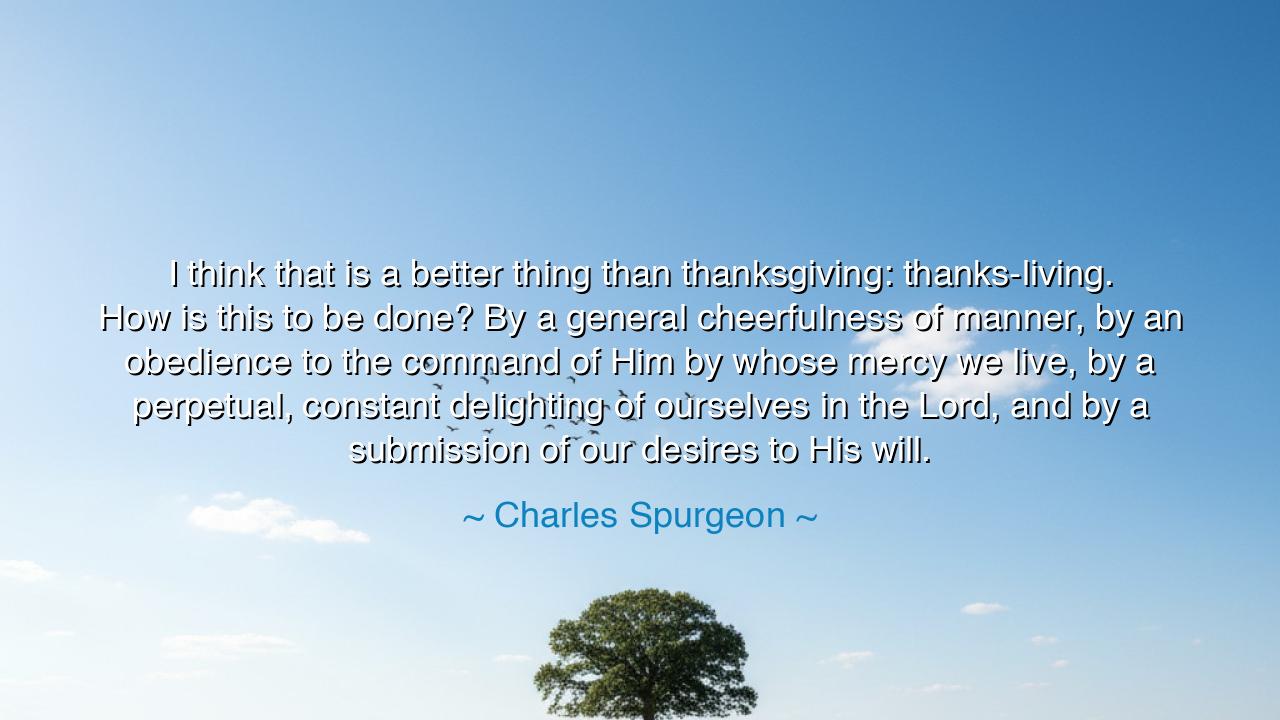
I think that is a better thing than thanksgiving: thanks-living.
I think that is a better thing than thanksgiving: thanks-living. How is this to be done? By a general cheerfulness of manner, by an obedience to the command of Him by whose mercy we live, by a perpetual, constant delighting of ourselves in the Lord, and by a submission of our desires to His will.






"I think that is a better thing than thanksgiving: thanks-living. How is this to be done? By a general cheerfulness of manner, by an obedience to the command of Him by whose mercy we live, by a perpetual, constant delighting of ourselves in the Lord, and by a submission of our desires to His will." In these words, Charles Spurgeon, the great preacher of the 19th century, lifts the heart from the ritual of one day into the sanctity of a whole life. He shows us that thanksgiving is not merely a table set once a year, but a posture of the soul—a daily rhythm of thanks-living. True gratitude, he teaches, is not confined to words or ceremonies, but expressed in the way one walks, speaks, and yields to the divine.
The origin of this wisdom lies in the Christian tradition that shaped Spurgeon’s preaching. For him, gratitude was not an isolated act, but a continuous offering to God, who sustains all existence through mercy. In the days of ancient Israel, the people offered sacrifices of thanksgiving at the altar. Spurgeon takes that same impulse and extends it: the sacrifice is no longer grain or lambs, but the heart that beats daily with cheerfulness, obedience, and delight in the Lord. In his vision, gratitude must become a way of living, not simply a ritualized act.
History bears out the power of this truth. Consider the life of George Müller, a man of Spurgeon’s own century, who cared for thousands of orphans in England. Müller rarely asked men for money, but trusted God to provide. Each day, even when bread was gone and cupboards were bare, he gave thanks in advance, and provision would come. His life was a shining example of thanks-living—gratitude not only when the table overflowed, but even when the table seemed empty, because he delighted in God above all.
Spurgeon also speaks of cheerfulness of manner, a gift not to be underestimated. For how often do people speak of gratitude but live with bitterness? The one who practices thanks-living wears gratitude like a garment, carrying warmth and light wherever they go. Even in hardship, a cheerful spirit testifies to the world that mercy sustains us still. In this, Spurgeon echoes the wisdom of the ancients: that the countenance itself can be a sermon, a living declaration of faith and joy.
The heart of thanks-living is also obedience. To give thanks with lips but disobey with deeds is hypocrisy; but to align the will with the divine is gratitude in its truest form. This requires submission—a word heavy with humility. To yield our desires is to declare that our life is not our own, but rests in the hands of the One who gives and takes away. Such submission transforms thanksgiving into a lifelong covenant, not dependent on circumstances but anchored in faith.
The lesson for future generations is this: gratitude must not be confined to a holiday, nor to a single prayer uttered at a meal. It must become a way of living—a thanks-living that breathes through daily conduct, speech, and thought. The world has no shortage of people who give thanks once a year; but it is transformed by those who live thanks every hour. Such lives are the truest sermons, teaching others not by lofty words but by radiant example.
Practical action follows: cultivate daily gratitude, not just seasonal thanks. Begin each morning with a word of appreciation, carry cheerfulness into your dealings, obey with humility, and delight in the blessings that cannot be purchased—love, mercy, breath itself. Submit your desires, trusting that the will of God is greater than your own plans. In this way, you will pass from thanksgiving into thanks-living, and your life will become a living hymn, a continuous feast of gratitude that blesses not only yourself but all who walk beside you.
Thus Spurgeon’s words resound across the ages: thanksgiving ends when the meal is over, but thanks-living endures until the last breath. It is not a day upon the calendar, but a life consecrated to joy, obedience, and surrender. And such a life, lived in constant gratitude, is the richest offering one can give back to the Giver of all.






AAdministratorAdministrator
Welcome, honored guests. Please leave a comment, we will respond soon